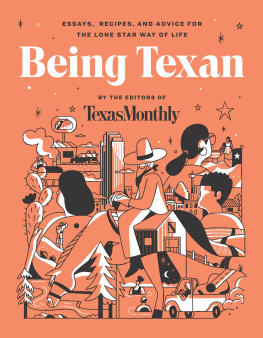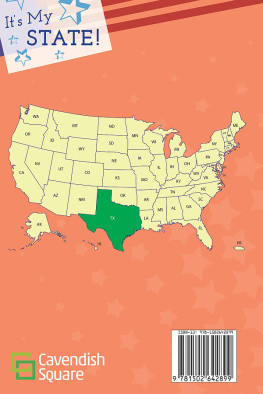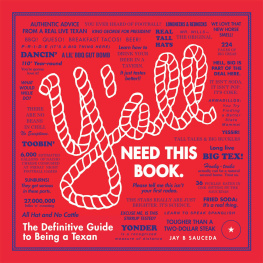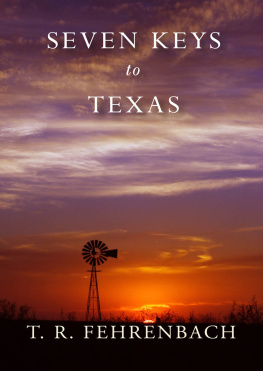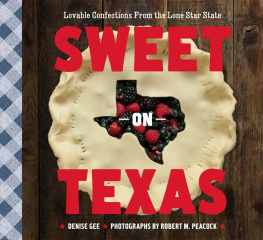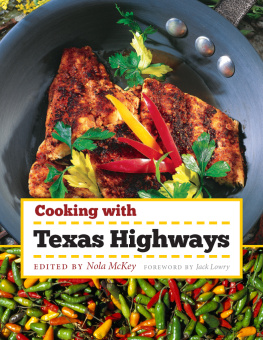Contents
Guide
The rosebuds here
Endure heat and frost
And sprout new hearts in every springs leaf
Whether planted by concrete or field
Today or yesterday
Deep purple to falls beckoning gold
Drawing in all the wandering bees
To the feast of a Texas shade
This ever-promising bloom
This sanctuary of disparate bodies
Worshipped in breath and lone starred skies
Welcomes us into its arms
In the swell of cicada cry
Deborah D.E.E.P. Mouton
Contents
By Dan Goodgame
TWO CENTURIES AGO, HOMES and businesses across the American South could be seen freshly abandoned, with a sign on the door that read Gone to Texas. Their former occupants often fled misfortuneor the lawand sought a fresh start in a place that promised great opportunity and adventure (at least if you were white). Texas fired the imagination of Americans like no place other than perhaps California, its only real peer in size and self-regardbut one that now, in a typical week, is losing to Texas some 1,600 migrants, many of them well educated, along with the headquarters of marquee companies such as Charles Schwab, Hewlett Packard Enterprise, and Oracle.
Today, more than a third of Texans were born elsewhere, up from a record low of about 25 percent in 1940. That proportion is rising rapidly as thousands more arrive each week, from locations as far-flung as Los Angeles and Lagos, Lucknow and Len. I am among those migrants: a proud Mississippian by birth and upbringing, but also happily a Texan for the past dozen years. I work in Austin and enjoy its energy, but live with my wife in San Antonio, a beautiful, friendly, historic, Tejano-majority city that we love. When friends visit, we have a strict requirement that they cycle with us down the river to visit the Spanish missions, ride horses in the nearby Hill Country, and shoot clay pigeons at the skeet range within earshot of our house.
Ive been fascinated by Texas from age eight, when my family took a leisurely drive across it, en route to visit relatives in California. We toured the Alamo and Big Bend National Park, and scarfed down what for us were exotic delights such as tacos de lengua and smoked brisket. I knew Id be back. Some two decades later, writing for Time magazine, I covered the campaign, and then the presidency, of George H. W. Bush. I became friendly with many of his Texas allies and rivals. I got to know the Lone Star State, visiting its wildly varied regions, from the subtropical Rio Grande Valley to the piney woods along the Louisiana border to rugged parts of the Panhandle that get as much snow as Philadelphia.
I also came to admire a magazine called Texas Monthly. Founded in 1973, TM has vividly chronicled the current events and culture of Texas, including the ways that newcomers have constantly changed what it means to be Texan, in every sphere from politics to music. Today, Im proud to serve as the magazines editor in chief, and to present this book on the states many pleasures, and its evolution.
In todays Texas, cowboys still tend cattleand sometimes perish while saving their herds from range fires. Wildcatters still strike it rich, and go broke, in the Permian Basin. And the states pitmasters and taqueros are still the most passionate and creative in the country. Theirs are iconic lifestyles here. But being Texan can also mean moving here from New Orleans and launching a food truck that specializes in gumbo tacos. It can mean being twelve years old and Black with a Stetson pulled low over your dreadlocks as you learn to ride rodeo bulls. It can mean walking into a Starbucks and hearing conversations in Arabic and Farsi and Nigerian-accented English. It can mean packing into a football stadium to hear the prime minister of India court your support and that of some 50,000 others among the 450,000 Texans who hail from that country.
What brings all these migrants here? The answer is very different for the Salvadoran fleeing gang violence than it is for the Silicon Valley software developer with stock options who compares his states top income-tax rate of 13 percent with the rate in Texas: zero. But both often come to appreciate much of what stirs the hearts of the native-born. Most newcomers learn to love the states diverse landscapes and people and cultures. They take pride in its triumphs, in everything from space exploration to sports championships. They develop a fierce attachment to homegrown brands, from Whataburger and Dr Pepper to Southwest Airlines and the ginormous gas-station-cum-country-store that is Buc-ees.
Texans are divided, even more than the rest of the country, on the role of government. Even as they recognize big shortcomings in racial justice, education, and health care, many are reluctant to raise taxes or add civil-rights protections. But theyre glad to help a neighbor and join with him for a practical cause. I recall breaking away from the Bush campaign in 1988 to see Democratic presidential nominee Michael Dukakis bungle what should have been a moving address on this topic. Speaking from a stack of hay bales in Idalou, Dukakis harked back to the Great Depression, when at night, much of Texas was lit only by fire. Texans Sam Rayburn and Lyndon Johnson worked with President Roosevelt to pass and implement the Rural Electrification Act, against opponents who described it as socialism. But your grandparents and your parents didnt believe the naysayers, I remember Dukakis saying, and they dug the holes and sunk the poles and strung the linesand the lights came on, all over Texas. Dukakis was trying to link that tradition to his pitch for a much bigger federal role in health insurance. But he missed a key ingredient in Texass support for the REA: neighbors tangibly helping one another.
If you get a flat tire in Texas, odds are someone will pull over pretty quickly to assist with the jack. But as my friend Paul Hobby, former publisher of Texas Monthly, adds with a smile: We dont want the gubmint telling us we have to do so.
Being Texan means taking risks and building things. My Texan friend of longest standing, Bo Baskin, grew up in Midland in West Texas and founded a boutique private-equity firm in Austin. Bo studied and worked for a time on the East Coast, and he observes that when someone from there meets someone new, what he or she first wants to know is Whered you go to college? Someone from the Deep South wants to know Who ah yo people? Someone from Texas asks, How can you and me partner up and make us some money? To be sure, commercial and social hierarchies shape the lives of Texas cities, but Ive found them more open to newcomers than in any of the dozen cities where Ive lived in the United States and abroad.
NOT LONG AGO, I was waiting at Londons Heathrow Airport for a flight back to Austin and grabbed some breakfast at a caf near the gate. In the booth behind me, a woman with a distinct Brooklyn accent was chatting with friends, one of whom asked how she was enjoying her recent move to the Texas capital. I love Austin, she replied, praising its cuisine and the music and tech scenes, but then added, Im trying to get used to it being in Texas.
I chuckled, but the exchange also made me sad. My mama taught me better than to interrupt a conversation among strangers. But I badly wanted to encourage that new Austinite to give the rest of Texas a chance. Drive ninety minutes west of the capital and tour a winery in Fredericksburg. Stop along the way at the Garrison Brothers distillery for a sip of my favorite bourbon. Drive (or cycle!) fifty miles south of the capital for a float trip down the Guadalupe, and then some live music at Gruene Hall. Hike Big Bend. Kayak on moss-draped Caddo Lake. Check out the hip-hop scene in Houston, and the exceptional Cameroonian and Vietnamese restaurants. Spend a weekend touring the fine museums in Fort Worth and grab some

